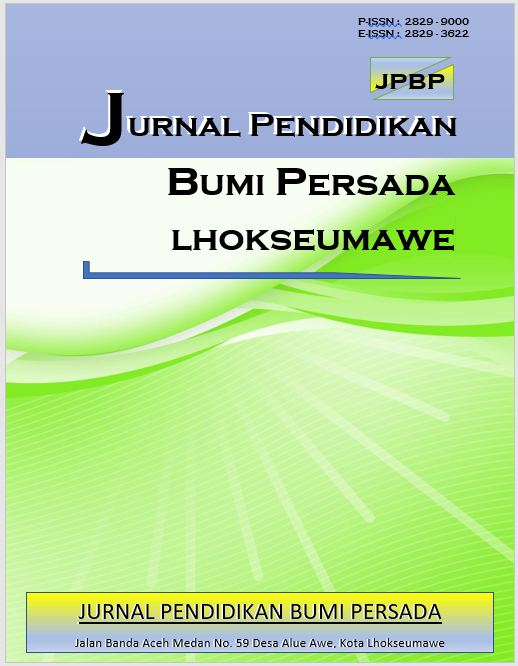VIDEO CLIPS AND AUDIO AS MEDIA TO INCREASE STUDENTS’ MOTIVATION
Kata Kunci:
English Audio, English Video Clips, Learning Speaking, Technology Utilization, Students’ MotivationAbstrak
This study investigated the effects of English video clips and audio on students’ motivation. It focused on 41 students at Universitas Bumi Persada, Lhokseumawe, Indonesia. An experimental design was employed in which the samples were chosen and grouped into two experimental classes: video and audio. The researchers taught speaking using English video clips in the first experimental class and audio in the second experimental class. Furthermore, the questionnaire was used as the data instrument to determine students’ motivation in learning to speak. The data were then analyzed using descriptive statistics. The data analyses found that learning English using video and audio stimulates students’ motivation to learn to speak. The data analyses also showed that students’ motivation in video class was stronger than that in audio class. However, there is no significant difference in terms of the student's motivation to learn to speak between students in the video and audio classes.
Referensi
Daskalovska, Nina., Gudeva, Liljana Koleva., & Ivanovska, Biljana. (2012). Learner motivation and interest. Procedia - Social and Behavioral Sciences, 46:1187-1191.
Gezegin, B.B. (2014 ). An Investigation Of Using Video Vs. Audio For Teaching Vocabulary. Procedia-Social and Behavioral Sciences 143, 450-457.
Grant, N. (2015). Motivational Media and Academic Success. Journal of Student Research, 4(1), 160-163.
Heafner, T. (2004). Using technology to motivate students to learn social studies. Contemporary Issues in Technology and Teacher Education, 4(1), 42-53.
Idris, A. O. (2015). The Effects of Audio-Visual Materials in the Teaching and Learning of the Speaking Skill in Junior Secondary Schools. International Journal of Social Science and Humanities Research, 3(3), 50-58.
Ilin, G., Kutlu, O., & Kutluay, A. (2013). An action research: Using videos for teaching grammar in an ESP class. Procedia-Social and Behavioral Sciences, 70: 272-281.
Mackey, A., & Gass, S. M. (2005). Second Language Research: Methodology And Design. London: Lawrence Erlbaum Associates.
Mattarima, K., & Hamdan, A. R. (2011). Learners’ Motivation And Learning Strategies In English Foreign Language (EFI) In Indonesian Context. Journal of Edupres, 1, 100-108.
Muslem, A., Zulfikar, T., Ibrahim, I. H., Syamaun, A., Saiful, , & Usman, B. (2019). The Impact of Immersive Strategy with English Video Clips On EFL Students’ Speaking Performance: An Empirical Study At Senior High School. Teaching English with Technology, 19(4), 90-103.
Noel, B. R. (2008). Conflict Resolution Education in Indonesia: Mapping Adaptations and Meanings. (Unpublished Doctoral Dissertation). Ohio University).
Oroujlou, Nasser., & Vahedi, Majid. (2011). Motivation, attitude, and language learning. Procedia - Social and Behavioral Sciences 29: 994-1000
Park, Y., & Jung, E. (2016). Exploring the Use of Video Clips for Motivation Building in a Secondary School EFL Setting. English Language Teaching, 9(10), 81-89.
Subramaniam, G. K. J., Abdullah, F.P., & Harun. R. N. S. R. (2013). Polytechnic Students’ Perceptions of YouTube Usage in The English Oral Communication Classroom. International Journal of Asian Social Science, 3(9),1962-1966.
Wang, Z. (2015). An Analysis of the Use of Video Materials in College English Teaching in China. International Journal of English Language Teaching, 2 (1), 23-28.
Yulia, Yuyun. (2013). Teaching Challenges In Indonesia: Motivating Students And Teachers’ Classroom Language. Indonesian Journal of Applied Linguistics, 3(1), 1-16.


